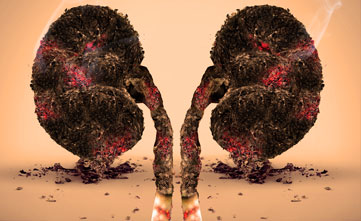
Tobacco affects nearly every organ
Tobacco use kills more than 7 million people every year. Research suggests that people who start tobacco use in their teens (as more than 70% do) and continue for two decades or more, will die 20 to 25 years earlier than those who never start up. It is not just lung cancer or heart disease that cause serious health problems and death. Some of tobacco use’s less publicized side effects include: hair loss, cataract, wrinkling, hearing loss, tooth decay, emphysema, osteoporosis, stomach ulcers, discoloured fingers, miscarriage, psoriasis, deformed sperm and Buerger’s disease.

Second-hand smoke impacts health
When second-hand smoke contaminates the air, especially in enclosed spaces, it is inhaled by everyone, exposing both smokers and non-smokers to its harmful effects. Tobacco smoke contains over 4000 known chemicals, many of which are harmful, with at least 40 that cause cancer. It also includes large quantities of carbon monoxide, which hinders the blood’s ability to carry oxygen to vital organs such as the heart and brain, and substances that contribute to heart disease and stroke. Protect all people from second-hand smoke through the adoption and implementation of legislative and other measures.

Tobacco is addictive and users need help to quit
Tobacco is highly addictive. Tobacco dependency is a chronic medical condition requiring repeated intervention and multiple attempts to quit. Most tobacco users want to quit but it can be hard to do so. To address this epidemic of tobacco use, prevention activities are not enough. Tobacco control efforts also need to help current users to quit. Giving up tobacco use has both immediate and long-term benefits. These benefits apply to all age groups, even those already suffering from tobacco-related health problems. Provide assistance for smoking cessation and tobacco dependency treatment.

Quit benefits and tips
Giving up tobacco use has both immediate and long-term benefits. These benefits apply to all age groups, even those already suffering from tobacco-related health problems. Benefits include: declines in lung function stop, walking gets easier, lung capacity increases, skin appearance improves, chronic cough disappears and the risk of heart attack falls. In the longer term, cessation reduces the risk of cancer, heart disease, stroke and respiratory diseases. Nicotine is highly addictive, leading those trying to quit smoking down a path of physical and psychological hardship. Kicking the habit, though not easy is not impossible either. Through determination, will power and some practical strategies, anything is possible.








